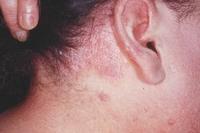Psoriasis, beyond the skin

Psoriasis is a superficial alteration, but it is not clear whether it occurs on the skin itself or whether the immune system is induced. According to a recent genetic study, it has its origin in the skin and in some cases favors the response of the immune system.
This research has been conducted by pathologists from Vienna. Two blocked genes have caused symptoms similar to psoriasis: JunB and c-Jun. This shows that the disease has a genetic basis. The role of the immune system is discussed below. These mice have blocked the response of T-lymphocytes and found that superficial alteration persists (arthritic inflammation has disappeared).
Researchers conclude that psoriasis is a complex interaction between the immune system and mutated skin cells.





